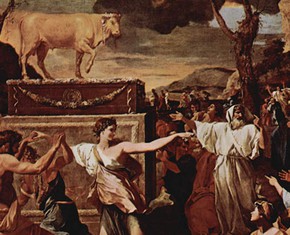The views expressed in our content reflect individual perspectives and do not represent the authoritative views of the Baha'i Faith.
I left the Lutheran church at the age of twelve, rejecting any God who would send souls to an eternal torture chamber named Hell. Then, curious and a little fascinated, I tried to rid my own soul of the idea.
So I wondered: Where does the concept of hell come from, anyway?
Looking into the history of Hades, I soon learned that my ancient Viking ancestors saw Hel – in Old Norse it’s spelled with only one “L” – as a frozen wasteland rather than a fiery abyss.
A kindly reference librarian showed me that the contemporary English word hell comes from either the Old Norse or proto-German word hel. Several other languages have a similar word, generally used to describe a place no one would want to go. The Anglo-Saxons used the Old English words hel and helle to refer to the world of the dead.
As I investigated the stories about hell, I realized something that surprised me, and might surprise you, too – the concept of hell doesn’t come from religion as much as it does from the mythic traditions.
According to Norse mythology, you went to Hel when you died of sickness or old age – as opposed to dying nobly as a warrior in battle, which earned you a one-way ticket to Valhalla, the hall of the chosen dead. So the ancient curse “Go to Hel!” originated from the Vikings, who had the alarming idea that the only honorable death could come in combat. In the Norse myths, a female demon named Hel – the daughter of the trickster Loki – presided over the place of the same name. The Norse God Odin appointed her to rule over vast mansions of Hel in a part of the kingdom called Niflheim, an icy cold abode of the dead fed by frozen rivers of tears.
Gradually this time-worn concept of Hel as a permanent, real place of eternal damnation and suffering took significant hold in the folklore of the far-flung lands the Vikings invaded and conquered, and spread widely. Eventually the mythological pagan Hel slowly transferred itself into Christian theology and its vocabulary as Europe Christianized over several centuries.
Of course the Judeo-Christian tradition already had its own hell, originally called Gehenna or Hinnom – an actual historical place that people feared and avoided. Once a garbage dump that constantly burned, today in Israel, you can still visit Gehenna, located at the base of Mount Zion in an idyllic valley near the old city of Jerusalem.
In Biblical times, legend had it that Gehenna/the valley of Hinnom supposedly housed apostates and idol-worshippers led by the kings of Judah, who sacrificed their own children by fire. That place became known in legends and tales as the eventual destination of the damned after death. People of the time considered the constantly burning fires of Gehenna/Hinnom much worse than the traditional abode of the dead, called Sheol in the Hebrew Bible or Hades in Greek mythology. That perception may have come about because the bodies of those who committed suicide, refused a Christian burial by the church, were often cremated in Gehenna’s garbage dump. Over time, the entire valley of Hinnom/Gehenna became known as a legendary cursed landscape of hell, where fire consumed the souls of the wicked.
Then, in 1604, the king of England, Christian priests and theologians decided to develop a new translation of the Bible. The King James version, first published in 1611, attempted to come up with one official Bible, originally composed of various chapters from many different Koine Greek, Hebrew and Aramaic sources. Despite the fact that the term never appears in the original Old or New Testament texts, the six panels of 47 men who translated the King James Bible replaced the names Gehenna, Sheol, Hinnom, Hades and “the grave” with one term – the now-popular Anglo-Saxon word hell.
In the King James Version of the Bible, the word hell occurs 54 times. In the original texts, no such word exists.
Oh, so that’s how we got the idea, I realized.
Christ used the word Gehenna many times, describing it symbolically as the opposite of life in God’s kingdom, a place where body and soul burned in “unquenchable fire.” – Mark 9:43. Clearly, Christ meant to refer to Gehenna – Jerusalem’s trash dump and crematorium – in a figurative and not a literal way. Unfortunately, lots of folks have taken things like that literally.
Interestingly, I learned, Gehenna in Arabic translates as Jahannam, and the Qur’an contains hundreds of references to Gehenna or Jahannam, identifying it as the Islamic hell, a metaphorical place where sinners receive their eternal punishment. Also in the Islamic tradition, the freezing hell called Zamhareer presents a vision of extreme coldness, with unbearable blizzards, unending snow and the chilling prospect of an icy, shivering eternity. In the Qur’an Zamhareer and Jahannam obviously serve as symbols, but still today, fundamentalists take them literally.
Originally intended to serve as a metaphor that stood for a bleak, terrible place where the dead do nothing and have no consciousness, and meant as a purely spiritual condition that indicated the torpor of the soul, the clergy of many different religions slowly transformed the cautionary idea of hell from symbolic to real, as a way to frighten and control people. Children, the uneducated and the superstitious, who made up the great mass of the populace at the time when many of the ancient religions first flourished, understood the stark terror the idea of hell inspired. Religious leaders then used the fear of hell to initially enforce the moral laws of their Faiths – and then, as their religions and their authority declined, for their own ends.
Once I’d discovered all of this hellacious history, I searched for a belief system that had a more sophisticated view of the afterlife. In my search I encountered the Baha’i Faith, and found that Baha’is believe the idea of hell doesn’t represent a place, but instead represents a spiritual condition that can afflict us anytime and anywhere:
Think ye of love and good fellowship as the delights of heaven, think ye of hostility and hatred as the torments of hell. – Abdu’l-Baha, Selections from the Writings of Abdu’l-Baha.
Baha’is believe that hell simply symbolizes remoteness from God, and from the higher human reality. The Baha’i writings describe heaven as a state of nearness to God, and hell as a condition of remoteness and estrangement from our own spiritual reality:
The reality underlying this question is that the evil spirit, Satan or whatever is interpreted as evil, refers to the lower nature in man. This baser nature is symbolized in various ways. In man there are two expressions: One is the expression of nature; the other, the expression of the spiritual realm. The world of nature is defective. Look at it clearly, casting aside all superstition and imagination … God has never created an evil spirit; all such ideas and nomenclature are symbols expressing the mere human or earthly nature of man. It is an essential condition of the soil of earth that thorns, weeds and fruitless trees may grow from it. Relatively speaking, this is evil; it is simply the lower state and baser product of nature. – Abdu’l-Baha, The Promulgation of Universal Peace.
So hell, as most of us already know, can happen right now and right here on Earth – we don’t need to wait for death and torment in some fiery subterranean abyss. We’ve all felt the various forms this kind of torment can take: the deep depression of failure, the pain and suffering the loss of love can cause, the terrible consequences wrong choices often create, the desperate affliction of addiction, the sense that the world holds nothing but pain. Even worse, hell can mean we continually harbor all of that hatred and hostility for others – and even for our own selves.
The Baha’i teachings offer humanity an alternative to that inner hell:
In the heavenly Books, mention is made of the immortality of the spirit, which is the very foundation of the divine religions. For rewards and punishments are said to be of two kinds – one being existential rewards and punishments and the other, ultimate rewards and punishments. Existential paradise and hell are to be found in all the worlds of God, whether in this world or in the heavenly realms of the spirit, and to gain these rewards is to attain life eternal. …
Existential rewards consist in the virtues and perfections that adorn the human reality. … Through these rewards he is reborn in spirit, is created anew, and becomes the manifestation of the verse in the Gospel that says that the Apostles “were born, not of blood, nor of the flesh, nor of the will of man, but of God” (Ezekiel 30:1-3) – that is, they were delivered from the animal characteristics and qualities that are inherent to human nature, and acquired divine attributes, which are the outpouring grace of God. …
For such souls, there is no greater torment than to be veiled from God, and no worse punishment than selfish qualities, evil attributes, baseness of character, and engrossment in carnal desires. When these souls are delivered from the darkness of these vices through the light of faith, when they are illumined by the rays of the Sun of Truth and endowed with every human virtue, they reckon it as the greatest reward and regard it as the true paradise. – Abdu’l-Baha, Some Answered Questions.
















Comments
Sign in or create an account
Continue with Googleor